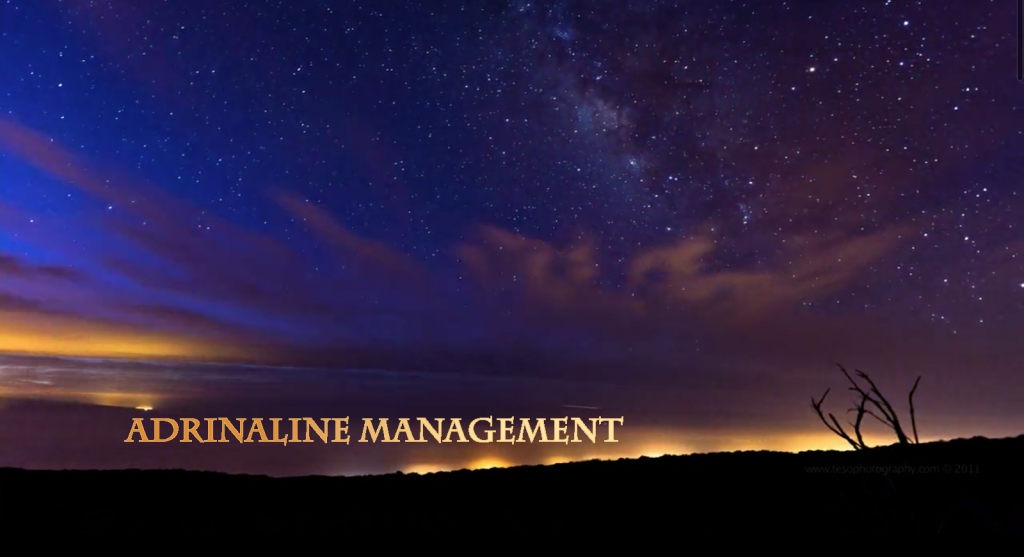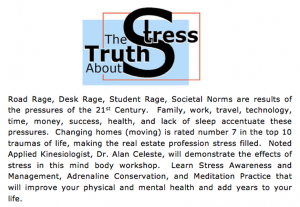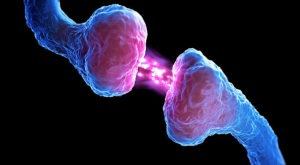
Confessions of an Adrenaline Junkie
First off, “No I’m not promoting a 12 Step Program”. (Perhaps… I should.)
In the following conversation, Dr. Celeste shares his secrets with Rossi of ROSSI Speaks:
Dr. Alan Celeste operates a private chiropractic practice in Raleigh, North Carolina. He specializes in “Applied Kinesiology,” a “system of nutrition and lifestyle planning for balancing body mechanics, body chemistry, and emotional health.”
Rossi: Alan, your knowledge, guidance, and simple approach to the management of ‘stress’ made such an overwhelming difference in my life that I’m pleased that you are willing to share it with my ROSSI Speaks community.
Alan: Rossi, I’m excited that you’ve asked me to become a part.
Rossi: A great percentage of the people that I work with attribute their ‘stress’ to lack of time management.
 You, however, convinced me that it’s ‘Choice Management’ not ‘Time Management’ that manifests high stress levels. see Omnitasking Let’s use one of my real estate clients for instance, if an agent chooses to take an overpriced listing, they know that they will have unhappy sellers calling constantly complaining, “My house isn’t being shown,” “Where are the offers?” and “What are you doing to get it sold?”! If they, the agent, had instead made the decision not to take overpriced listings, their stress would be diminished, do you agree?
You, however, convinced me that it’s ‘Choice Management’ not ‘Time Management’ that manifests high stress levels. see Omnitasking Let’s use one of my real estate clients for instance, if an agent chooses to take an overpriced listing, they know that they will have unhappy sellers calling constantly complaining, “My house isn’t being shown,” “Where are the offers?” and “What are you doing to get it sold?”! If they, the agent, had instead made the decision not to take overpriced listings, their stress would be diminished, do you agree?
Alan: Yes, I agree. The quest for happiness, wellness, and quality of life is about choices,
the right choices to keep life moving forward in a healthy and fulfilling manner. When one is committed to, and sticks with, positive choices, stress can be diminished. One can be secure in the knowledge that the very nature of our existence improves proportionally to the number of good choices we make. Be confidant that, like a savings account, the small efforts made to treat the body and soul with respect accumulate — and result in improved quality of life.
You demonstrated one of these small efforts the other night after dinner with a reframe of your fortune cookie; do you recall what you said?”
Rossi: Yes, we were through with dinner and were taking turns opening and reading aloud our fortune cookies.
Alan: And yours was empty.
Rossi: Yeah, and everyone at the table said, ‘Ohhhhhh, too bad!’
Alan: And you said something like, ‘How lucky I am to have all the fortune I can hold.’ Everyone then said, ‘Ohhhh, how nice!’ A small effort and a positive reframe.
Rossi: It’s a selfish thing that I do. When people show pity I reframe, or restate, positively in order to diminish personal stress.
Alan: The very word – stress- can send shivers up and down the spine.
 No one has trouble conjuring up some event, person, place, or thing that stirs him or her up. Most everyone, when asked about stress, will immediately associate with negative and tumultuous situations.
No one has trouble conjuring up some event, person, place, or thing that stirs him or her up. Most everyone, when asked about stress, will immediately associate with negative and tumultuous situations.
The fact is, however, that positive events will trigger the same responses inside the body. Further, by understanding the adrenaline response that is central to the stress reaction, one can control it to their advantage.
I have found that stress is so tightly associated with negative circumstances that folks do much better with different terminology; a reframe. I prefer to refer to stressors as adrenaline stimulators.
The concept of Stress Management then reframes to that of Adrenaline Management.
 This language will help to avoid getting caught up in old patterns of thought.”
This language will help to avoid getting caught up in old patterns of thought.”
Rossi: I like the reframe, as I see many people today in all walks of life with multiple adrenaline stimulators. Especially the fast paced BigData society we currently live in.
Alan, you stated that, ‘positive events will trigger the same responses’ as the negative ones. What do you mean?
Alan: First, we need to define adrenaline,
which is a hormone produced when the body is asked to do something extra. It is a powerful stimulant that has immediate and profound effects on most every organ system. The heart rate increases, pupils dilate, the lungs expand, blood is rushed to the muscles and away from the digestive tract; this is the classic fight or flight response. There are many times when these physical responses are critical to our survival.
 Rossi: Like when we see volatile swings in the stock market which are most likely caused by the speed of which information and data is acted, or reacted upon. There is nothing the individual has done or can do to change or effect it.
Rossi: Like when we see volatile swings in the stock market which are most likely caused by the speed of which information and data is acted, or reacted upon. There is nothing the individual has done or can do to change or effect it.
Alan: Yes, that would be a negative adrenaline stimulator.
In fact, adrenaline stimulators don’t discriminate.
Positive and negative adrenaline stimulators are emotional and psychological in nature; often the physiological responses are not necessary. In addition, I would suspect that to many of the successful investment performers, emotional burden is un-relentless; adrenaline production is quite often elevated above and beyond its useful level. Over stimulation of the adrenaline system can cause negative effects on one or more of your body’s systems. Likewise Rossi, many of the things that we do for fun – things with high excitement levels – are adrenaline stimulators, too. Everything from waterskiing to scary movies to sporting events to your rigorous travel and speaking engagements center their demand on the adrenaline stimulation.
Rossi: I know, with me, over stimulation of the adrenaline system causes many problems; Acid Reflux.
Alan: Excessive adrenaline stimulation pushes your stomach down and creates acid reflux. You were eating hands full of Rolaids a day if I recall.
Rossi: You’re right. Then I developed low back pain.
Alan: That happened when the over stimulation pushed your stomach muscles down and caused miss-alignment of your back.
Rossi: And, as I felt increasingly stressed and unhealthy, I looked for rewards, quick fixes to make me at least think I was feeling better. Sugar and caffeine were my drugs of choice. A Snickers bar here and a handful of M&M’s there, a Starbucks Venti Americana…”
Alan: Most of us know when we are doing things that work against us physically, emotionally, and spiritually. This can happen for most any reason, convenience, fun, self-loathing (just wanted to see if you were paying attention!). Our subconscious selves can work hard to sabotage even the best intentioned person.
Rossi: Realizing that excessive adrenaline stimulation was the cause of many of the problems I was having, I sought your advice.
You calmly said I would first have to recognize it as an addiction.
Alan: And you immediately replied, ‘Oh no, not another 12 step program,’ which I found very funny. But excessive adrenaline stimulation is addictive. For instance, you need to have a task completed by noon on Tuesday, and it is 8:00 a.m. on Monday. You get a little adrenaline rush and you get the task done. Now, it is next week and you again have the Tuesday noon task to complete. This time you let it slide until 3:00 p.m. and, WHOOSH, you get an adrenaline rush that catapults you to completion. You see, you purposefully put off what you needed to get done because you didn’t get a big enough hit at 8:00 a.m. That’s being addicted to the rush.
Rossi: So, we don’t procrastinate because we’re lazy, we put things off to get a bigger ‘hit’ of adrenaline?
Alan: Correct, and next Monday you’ll wait until 6:00 p.m. for an even bigger rush. Just like the addict looking for the stronger drug for the bigger high.
Rossi: You are so right. I continually push things back and then in a burst of energy I get it done in a high adrenaline, stimulated state irritating many in my path and draining my energy!
Alan: Lack of adrenaline management strategies often leaves a destructive path. Personal health, relationships, work environment.
Rossi: Then you’re saying this adrenaline rush is counter productive.
Alan: No, positive adrenaline stimulants are very productive,
just look at the Olympians last month in Greece. When Jenny Thompson was at the edge of the pool waiting for the start, she was in a positive adrenaline stimulated state.
However, when you find yourself seeking the adrenaline rush for inconsequential reasons, or just to achieve the adrenaline high, these are negative adrenaline stimulants. And yes, they are counter productive.
Rossi: You taught me to pause when in a situation where I was getting pumped up for no valuable reason, to become conscious of what I was doing, and make the choice to ‘stop it’. You said that I might experience the sensation of a rubber band snapping back to its original shape throughout the body. You were right it’s a remarkable practice and a great trick.
Alan: The trick is to get healthy enough so that some small transgressions (lack in adrenaline management) don’t completely knock you off your feet.
One can do this by building up the body so that it has some reserve and resilience. Commitment to make more healthy choices des not require you to become a Grape Nut lovin’ tree-hugger and never eat something with icing ever again. It does, however, require retraining, education, and an attitude of more self-reliance. Healthy thoughts and attitudes beget healthy actions!
CHOICE
R ossi: Alan, I can’t thank you enough for this excellent information on the effect of making small positive choices in our lives.
ossi: Alan, I can’t thank you enough for this excellent information on the effect of making small positive choices in our lives.
Alan: As in choosing which house to purchase, we did so based on the knowledge and information our agent shared. It’s my hope that with sharing this knowledge, I can assist others in making right choices in adrenaline management. Again, the quest for happiness, wellness, and quality of life is about choices; small choices we make daily to keep our lives moving forward in a healthy, fulfilling, and positive manner. It takes daily practice, as the mind and body get better at what they do.

